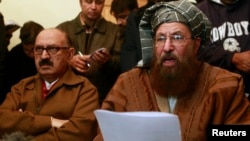ISLAMABAD, PAKISTAN —
The Taliban-appointed team to negotiations with the Pakistan government say the militant leaders have adopted a "positive" attitude to peace talks held last week with the government. The government says the negotiations are just one aspect of their counter-terrorism policy.
Maulana Yusuf Shah, a member of the Taliban-nominated peace negotiation team, returned from the northwestern tribal North Waziristan province Monday, saying he was encouraged by the Pakistani militant group’s reactions to the government's latest outreach.
He said the leaders of the Pakistani Taliban -- the "shura", or council of elders -- had adopted a very positive attitude and gave a very positive response to the government's overtures. He said he remains hopeful.
The Taliban representatives had traveled by helicopter to the remote tribal area to gather the militant's response to the government-initiated peace talks that opened last week in Islamabad.
Shah said US-controlled drones were buzzing the skies overhead as talks with the leaders of the Pakistani Taliban, Tehreek-e-Taliban militants, took place.
Shah declined to outline the Pakistani Taliban’s full response to the Pakistan government’s conditions for formal peace talks, namely, that the formal discussions are held within the framework of the nation’s current constitution, and focus only on the insurgency in the northwest.
Local media reports had said the militant group had laid out a number of counter demands, including the imposition of strict Islamic law in Pakistan.
It is not clear when the government and Taliban negotiating teams will meet again.
Pakistani National Security and Foreign Policy Advisor Sartaj Aziz said the talks are just part of the complex picture of militant violence in Pakistan.
“We have inherited a very complex problem, after [2001], 9/11, when all the people who we had jointly trained with America, trained, funded and armed to fight the Russians, were pushed into our side of the border, so we need a very concerted, long/medium-term strategy to deal with this problem,” said Aziz.
Despite Pakistani government efforts, violence continues unabated in the country.
Over the weekend, separatist militants blew up three gas pipelines in southwestern Pakistan. Gunmen shot and killed eight people in the southern city of Karachi, and a suicide bomber in the northern city of Peshawar on Monday left four people dead.
Maulana Yusuf Shah, a member of the Taliban-nominated peace negotiation team, returned from the northwestern tribal North Waziristan province Monday, saying he was encouraged by the Pakistani militant group’s reactions to the government's latest outreach.
He said the leaders of the Pakistani Taliban -- the "shura", or council of elders -- had adopted a very positive attitude and gave a very positive response to the government's overtures. He said he remains hopeful.
The Taliban representatives had traveled by helicopter to the remote tribal area to gather the militant's response to the government-initiated peace talks that opened last week in Islamabad.
Shah said US-controlled drones were buzzing the skies overhead as talks with the leaders of the Pakistani Taliban, Tehreek-e-Taliban militants, took place.
Shah declined to outline the Pakistani Taliban’s full response to the Pakistan government’s conditions for formal peace talks, namely, that the formal discussions are held within the framework of the nation’s current constitution, and focus only on the insurgency in the northwest.
Local media reports had said the militant group had laid out a number of counter demands, including the imposition of strict Islamic law in Pakistan.
It is not clear when the government and Taliban negotiating teams will meet again.
Pakistani National Security and Foreign Policy Advisor Sartaj Aziz said the talks are just part of the complex picture of militant violence in Pakistan.
“We have inherited a very complex problem, after [2001], 9/11, when all the people who we had jointly trained with America, trained, funded and armed to fight the Russians, were pushed into our side of the border, so we need a very concerted, long/medium-term strategy to deal with this problem,” said Aziz.
Despite Pakistani government efforts, violence continues unabated in the country.
Over the weekend, separatist militants blew up three gas pipelines in southwestern Pakistan. Gunmen shot and killed eight people in the southern city of Karachi, and a suicide bomber in the northern city of Peshawar on Monday left four people dead.





